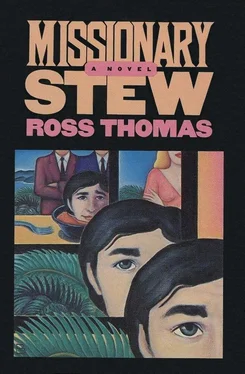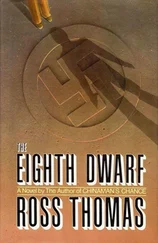Ross Thomas - Missionary Stew
Здесь есть возможность читать онлайн «Ross Thomas - Missionary Stew» весь текст электронной книги совершенно бесплатно (целиком полную версию без сокращений). В некоторых случаях можно слушать аудио, скачать через торрент в формате fb2 и присутствует краткое содержание. Город: New York, Год выпуска: 1983, ISBN: 1983, Издательство: Simon & Schuster, Жанр: Политический детектив, на английском языке. Описание произведения, (предисловие) а так же отзывы посетителей доступны на портале библиотеки ЛибКат.
- Название:Missionary Stew
- Автор:
- Издательство:Simon & Schuster
- Жанр:
- Год:1983
- Город:New York
- ISBN:978-0-671-49363-9
- Рейтинг книги:3 / 5. Голосов: 1
-
Избранное:Добавить в избранное
- Отзывы:
-
Ваша оценка:
- 60
- 1
- 2
- 3
- 4
- 5
Missionary Stew: краткое содержание, описание и аннотация
Предлагаем к чтению аннотацию, описание, краткое содержание или предисловие (зависит от того, что написал сам автор книги «Missionary Stew»). Если вы не нашли необходимую информацию о книге — напишите в комментариях, мы постараемся отыскать её.
Missionary Stew — читать онлайн бесплатно полную книгу (весь текст) целиком
Ниже представлен текст книги, разбитый по страницам. Система сохранения места последней прочитанной страницы, позволяет с удобством читать онлайн бесплатно книгу «Missionary Stew», без необходимости каждый раз заново искать на чём Вы остановились. Поставьте закладку, и сможете в любой момент перейти на страницу, на которой закончили чтение.
Интервал:
Закладка:
“Except this last time,” Haere said.
“Right. He knocked on the door and there he was, right out of Maugham — shabby old suit, three-day beard, gin for breakfast — everything.”
“Who?”
“Meade.”
“Drew Meade.”
Replogle nodded.
“Jesus.”
Draper Haere had been barely twelve years old when Drew Meade, revealing himself for the first time as an undercover FBI agent, appeared as the star witness before an investigating U.S. Senate subcommittee. Meade swore that Haere’s father, the overage former private first class in the Americal division and, prior to that, a youngish lieutenant in Spain with the Lincoln Battalion (not brigade, kid, battalion), had been then and was indeed even yet a card-carrying, dues-paying member of the Communist Party (U.S.A.).
Out of more than mild curiosity, Draper Haere had kept track of Drew Meade over the years, finally losing both interest and Meade’s trail in the late sixties.
“I heard he went with Langley,” Haere said. “I heard he crossed over in ’sixty-one or — two — around in there.”
“ ’Sixty-one,” Replogle said. “He wound up in Laos in ’sixty-nine and by then he was maybe four or five years away from retirement, but he went into dope instead and Langley dumped him, very quietly.”
“He was dealing?” Haere said, unable to keep the surprise out of his tone.
Replogle nodded. “In a big way. But when I talked to him he was flat broke.”
“Where was this?”
“Up in my room. He knocked on my door, I opened it, and there he stood — just what I was hoping for: somebody to tell me a story.”
“How much did he want for it?”
“His story? Fifty thousand, but I knocked that down to ten grand pretty quick.”
“It still must be some story.”
“Yeah,” Replogle said, “it is.” He paused for a moment and then continued in his most precise engineering manner. “Meade came to me because, one, he remembered how close your dad and I always were; two, because he knew I could use what he was going to tell me; and three, because I could pay for it. Pay pretty good, in fact. That was the most important. Well, I had to give him the money first, and that meant a trip to the bank. Then he had to have a few drinks before he’d finally sit down and tell me how it all began six months ago down in Miami when Langley—”
Replogle never finished the secondhand story because the big blue Dodge pickup honked and pulled up on the left. Haere looked over. There were two persons in the pickup. Both wore ski masks. The pickup and the station wagon had reached a sharp curve in the deep canyon. On the station wagon’s right, some fifty or sixty feet below, was a frozen creek.
The pickup swerved, and its right front fender slammed into the station wagon, which went into a skid on a patch of ice. Haere later thought they must have been counting on that — the ice. Replogle did everything he was supposed to do. He kept his foot off the brake. He steered into the skid. He swore.
The station wagon plunged over the side. On either the first or second roll the right-hand door popped open and Draper Haere popped out. He landed in a snowbank. The station wagon somersaulted two more times, end over end, and smashed against some immense boulders at the creek’s edge. Two seconds later the gas tank exploded.
Haere got up and made himself stumble through the snow down to the burning car. He tried to open its front left door, but it was either jammed or locked. Haere burned his hands trying to get the door open. He finally could stand neither the heat nor the pain, so he moved backward, tripped over something, and sat back down in a snowbank. He jammed his scorched hands down deep into the snow and sat there watching Jack Replogle burn to death if, indeed, he wasn’t already dead. In either event, there was nothing Draper Haere could do about it.
Chapter 5
After his hands were treated by a doctor in Idaho Springs, Draper Haere talked to a trio of policemen that consisted of a fiftyish Clear Creek County deputy sheriff and two mustachioed, look-alike investigators from the Colorado Highway Patrol.
Haere described the blue Dodge pickup and its two masked occupants as best he could. He also said he didn’t think it was an accident: that as far as he could tell it had seemed intentional. The policemen nodded somberly, looked thoughtful, and marked it down as hit-and-run. Haere didn’t mention Jack Replogle’s tale about the CIA and Singapore and Drew Meade, because he could see no purpose it would serve.
Since Haere no longer went to funerals, he didn’t stay for Jack Replogle’s. Instead he called Maureen, Replogle’s wife, to express his condolences. Maureen was appropriately tearful and, as always, excessively dramatic.
“Tell me he didn’t suffer, Draper,” Maureen Replogle said.
“He didn’t suffer, Maureen.”
“That man was my life — my entire life. How can I live without him? How can I possibly go on living without him? I’m thinking of killing myself, Draper. I’ve got some sleeping pills. I’ll just take those and when I wake up I’ll be with Jack.”
“I don’t think Jack would really want you to do that, Maureen. He’d want you to go on living for as long as possible.”
There was a silence and then Maureen said in a very small voice, “Do you really think so?”
“I’m sure of it.”
There was another silence and then the tears started again. “Do you know what I am, Draper? I’m — oh, my God — I’m a widow.”
Maureen hung up without saying goodbye, and Draper Haere went aboard the United flight to Los Angeles. There, in the first-class section, even before the plane took off, he asked for and was served a martini, which he drank through a couple of straws because of his lightly bandaged hands.
During the two-hour flight to Los Angeles, Haere stared down at the occasional lights six miles below and thought about death and dying and the last funeral he had attended, which had been that of his father twenty-five years before in Birmingham, Alabama.
Father and son had moved to Birmingham from Denver in 1954, when the senior Haere had managed to secure a job on the copy desk of the Birmingham News.The News didn’t seem to care whether the senior Haere was a communist or not as long as he was a competent journeyman who would work cheap. Haere was just finishing his junior year in high school when his father — on his day off — started going down to Sylacauga on the bus. Haere at first thought his old man had found a lady friend, until father invited son to go along. They got off the Trailways bus at the combination depot and five-and-dime and walked three miles out of town to a small farmhouse, where they sat on the front porch with a man of about the same age as Haere’s father. Haere drank lemonade. The two men drank beer. Nobody said much. The other man had also served in Spain, and his left leg was gimpy. They sat there in the warm spring afternoon in a not uncomfortable silence that seemed both to separate and embrace what surely were the only two veterans of the Abraham Lincoln Battalion in Alabama. A Sunday or so later, when Haere’s old man asked him if he’d like to go down to Sylacauga again, Haere said no.
On March 25,1957, Haere was summoned to the office of the high school principal and informed that he was being offered a full four-year scholarship to Harvard. “That’s in Cambridge,” the principal said. “In Massachusetts.” Haere told the principal he would have to think it over.
It wasn’t until years later that Haere learned that it wasn’t his straight-A average that had won him the Harvard scholarship. Instead, it had been Jack Replogle calling in a political debt. Replogle had called Big Ed Johnson of Colorado, who had called Big Jim Folsom of Alabama, who had called a Birmingham banker who had earned both his B.A. and M.B.A. at Harvard. Big Jim as governor kept large sums of the state’s money interest-free in the banker’s bank. The banker was one of Harvard’s unofficial scholarship scouts. It took only a few minutes for the banker to decide that Draper Haere would do wonderfully well at his alma mater.
Читать дальшеИнтервал:
Закладка:
Похожие книги на «Missionary Stew»
Представляем Вашему вниманию похожие книги на «Missionary Stew» списком для выбора. Мы отобрали схожую по названию и смыслу литературу в надежде предоставить читателям больше вариантов отыскать новые, интересные, ещё непрочитанные произведения.
Обсуждение, отзывы о книге «Missionary Stew» и просто собственные мнения читателей. Оставьте ваши комментарии, напишите, что Вы думаете о произведении, его смысле или главных героях. Укажите что конкретно понравилось, а что нет, и почему Вы так считаете.












